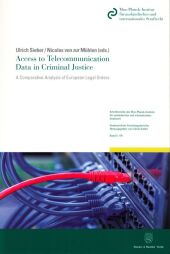 Neuerscheinungen 2016Stand: 2020-02-01 |
Schnellsuche
ISBN/Stichwort/Autor
|
Herderstraße 10
10625 Berlin
Tel.: 030 315 714 16
Fax 030 315 714 14
info@buchspektrum.de |

Nicolas von zur Mühlen, Ulrich Sieber
(Beteiligte)
Access to Telecommunication Data in Criminal Justice.
A Comparative Analysis of European Legal Orders.
Herausgegeben von Sieber, Ulrich; Mühlen, Nicolas von zur
2016. VII, 771 p. 224 mm
Verlag/Jahr: DUNCKER & HUMBLOT 2016
ISBN: 3-428-15143-7 (3428151437)
Neue ISBN: 978-3-428-15143-1 (9783428151431)
Preis und Lieferzeit: Bitte klicken
Access to telecommunication data is an essential and powerful investigative tool in criminal justice. At the same time, the interception of such data can seriously affect individual privacy. The legal instruments and provisions that allow the gathering of these data are primarily the traditional rules on the interception of telecommunication based on the cooperation duties of telecommunication providers. The rules governing these interception techniques vary considerably among the national legal orders. This publication provides a comparative analysis as well as country reports on the following European legal orders, which form the basis of this comparison: Belgium, Czech Republic, France, Germany, Spain, Sweden, and the United Kingdom.
"Den Herausgebern Sieber und von zur Mühlen ist mit dieser Studie eine beeindruckende rechtsvergleichende Arbeit von erheblichem Umfang gelungen, die detailreich die TK-Überwachung in der EU untersucht. Auf Grund von Einbeziehung sowohl von Wissenschaftlern als auch von Praktikern bei der Entstehung des Werkes können zahlreiche neue Einsichten und hilfreiche Erkenntnisse gewonnen werden. [...] In erster Linie interessant sein dürfte dieses Buch für die rechtswissenschaftliche Forschung im Bereich der staatlichen Überwachung und Ermittlungstätigkeit; aber auch für den interessierten Praktiker mit juristischer Vorbildung im Bereich der TK-Überwachung stellt das Werk eine Hilfestellung im Arbeitsalltag dar." Dr. Dennis-Kenij Kipker, in: MultiMedia und Recht, 5/2017
Access to telecommunication data is an essential and powerful investigative tool in criminal justice. At the same time, the interception of such data can seriously affect individual privacy. This is true not only with respect to content data but also with respect to traffic data. The legal instruments and provisions that allow the gathering of these data are primarily the traditional rules on the interception of telecommunication based on the cooperation duties of telecommunication providers. In addition, access to telecommunication data can also be granted by rules on remote forensic software, by search and seizure of - temporarily or permanently - stored data, and (especially in cases of traffic and subscriber data) by production orders demanding the delivery of stored data.
The rules governing these interception techniques vary considerably among the national legal orders. These differences are not only most interesting from the perspective of fundamental research in the area of comparative criminal law but also for practical reasons, such as identifying best practices and evaluating the scope of international cooperation.
This publication provides a comparative analysis dealing with the commonalities and differences of these rules on interception and other means of access to telecommunication data. It also includes country reports on the following European legal orders, which form the basis of this comparison: Belgium, Czech Republic, France, Germany, Spain, Sweden, and the United Kingdom.
Preface
Introduction: Object, Aims, and Research Methods
Comparative Analysis
Country Reports
Belgium - Czech Republic and Slovakia - France - Germany - Sweden - Spain - United Kingdom
Appendix: Questionaires
Authors


